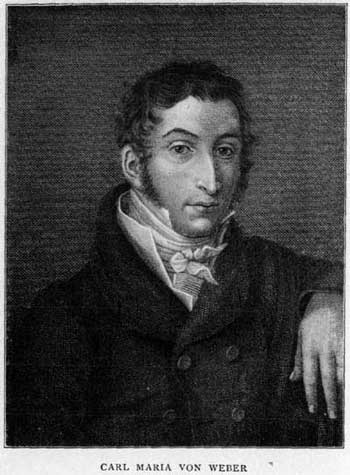quoted in Harold C. Schonberg, The Great Conductors (1981) ISBN 0671208349
Carl Maria von Weber Quotes
Carl Maria Friedrich Ernst von Weber was a German composer, conductor, pianist, guitarist and critic, and was one of the first significant composers of the Romantic school.
Weber's operas Der Freischütz, Euryanthe and Oberon greatly influenced the development of the Romantische Oper in Germany. Der Freischütz came to be regarded as the first German "nationalist" opera, Euryanthe developed the Leitmotif technique to an unprecedented degree, while Oberon may have influenced Mendelssohn's music for A Midsummer Night's Dream and, at the same time, revealed Weber's lifelong interest in the music of non-Western cultures. This interest was first manifested in Weber's incidental music for Schiller's translation of Gozzi's Turandot, for which he used a Chinese melody, making him the first Western composer to use an Asian tune that was not of the pseudo-Turkish kind popularized by Mozart and others.
A brilliant pianist himself, Weber composed four sonatas, two concertos and the Konzertstück in F minor , which influenced composers such as Chopin, Liszt and Mendelssohn. The Konzertstück provided a new model for the one-movement concerto in several contrasting sections , and was acknowledged by Stravinsky as the model for his Capriccio for Piano and Orchestra. Weber's shorter piano pieces, such as the Invitation to the Dance, were later orchestrated by Berlioz, while his Polacca Brillante was later set for piano and orchestra by Liszt.
Weber's compositions for clarinet, bassoon, and horn occupy an important place in the musical repertoire. His compositions for the clarinet, which include two concertos, a concertino, a quintet, a duo concertante, and variations on a theme from his opera Silvana, are regularly performed today. His Concertino for Horn and Orchestra requires the performer to simultaneously produce two notes by humming while playing—a technique known as "multiphonics". His bassoon concerto and the Andante e Rondo ungarese are also popular with bassoonists.
Weber's contribution to vocal and choral music is also significant. His body of Catholic religious music was highly popular in 19th-century Germany, and he composed one of the earliest song cycles, Die Temperamente beim Verluste der Geliebten . Weber was also notable as one of the first conductors to conduct without a piano or violin.
Weber's orchestration has also been highly praised and emulated by later generations of composers – Berlioz referred to him several times in his Treatise on Instrumentation while Debussy remarked that the sound of the Weber orchestra was obtained through the scrutiny of the soul of each instrument.
His operas influenced the work of later opera composers, especially in Germany, such as Marschner, Meyerbeer and Wagner, as well as several nationalist 19th-century composers such as Glinka. Homage has been paid to Weber by 20th-century composers such as Debussy, Stravinsky, Mahler and Hindemith .
Weber also wrote music journalism and was interested in folksong, and learned lithography to engrave his own works.
